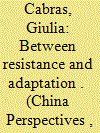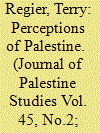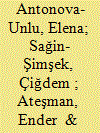| Srl | Item |
| 1 |
ID:
158297


|
|
|
|
|
| Summary/Abstract |
The urban areas of Xinjiang have recently experienced major changes in their demographic, urban, ethnic, and linguistic landscapes. Ürümchi, the capital of the Xinjiang Uyghur Autonomous Region, is a typical example of this. In this city, which is undergoing rapid economic and urban expansion, the Han make up around 72% of the population and the Chinese language is ever more present in the language use of the Uyghurs. This study examines the place of the Uyghur language in the context of the sinicisation of the city of Ürümchi, its role in the daily life of the Uyghur community, and opportunities for its use and revitalisation.
|
|
|
|
|
|
|
|
|
|
|
|
|
|
|
|
| 2 |
ID:
144591


|
|
|
|
|
| Summary/Abstract |
Cultural norms and trends are often reflected in patterns of language use. This article explores cultural perceptions of Palestine and Palestinians in the English-speaking world, through two analyses of large linguistic datasets. The first analysis seeks to uncover current conceptions of participants in the Israel-Palestine conflict, by identifying words that are distinctively associated with those participants in modern English usage. The second analysis asks what historical-cultural changes led to these current conceptions. A general theme that emerges from these analyses is that a cultural shift appears to have occurred recently in the English-speaking world, marked by greater awareness of Palestinian perspectives on the conflict. Possible causes for such a cultural shift are also explored.
|
|
|
|
|
|
|
|
|
|
|
|
|
|
|
|
| 3 |
ID:
140705


|
|
|
|
|
| Summary/Abstract |
Although Turkey houses various immigrant groups, still not much is known about them. To this end, this study aims to initiate a report of a particular group of immigrants residing in Turkey. Specifically, we focus on the language use, preference and attitudes of Russian immigrants in Turkey in the belief that communication processes lie at the heart of the acculturation processes and reflect the degree to which immigrants adapt to the host society. The data have been collected from 109 Russians permanently residing in Turkey through a questionnaire and interviews. Our findings suggest that the Russian diaspora reveals a pure sample of integration to the Turkish host society and they can be defined as “bi-dominant,” that is, capable of using the two languages jointly depending on their needs and communicational contexts, and as “bi-cultural,” that is, acculturated into the Turkish host culture while at the same time retaining their Russian roots.
|
|
|
|
|
|
|
|
|
|
|
|
|
|
|
|